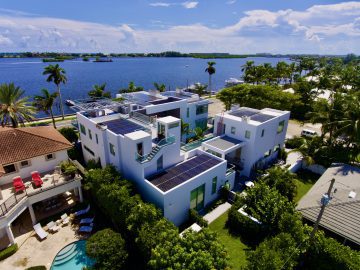If you’re considering investing in a solar pool heater but aren’t quite sure if a pool heat pump is better, this article is a helpful tool in showing you a breakdown of the costs and benefits associated with each to help you make an informed decision that suits your pool-heating needs.
Let’s start with electric pool heaters.
Option #1: Electric Heat Pump Pool Heaters
Over the past 10 years, the electric heat pump has been on the rise in the pool industry, especially in new-construction pools. Consequently, electric bills have also been on the rise for homeowners due to the energy needed to support them.
What’s important to understand is that an electric heat pump for a pool is just like an air-conditioning unit, and the efficiency of the pump is related to the air temperature vs. the pool water temperature. So when it’s hot outside and your desired heat is close to the current temperature, then the electricity needed for the heat pump to maintain that temperature is relatively efficient.
Understanding the Science Behind Electric Heat Pumps
For one unit of electricity (kWH) consumed, you can put up to 5 or 6 times the heating energy (kBTU/hr) into your pool water. However, as the ambient temperature drops, the efficiency of an electric heat pump also drops. In fact, at a certain temperature, heat pumps will stop working or will be astronomically inefficient. That means you could be using electricity and barely be putting any heat into your pool.
If you want to swim (or enjoy a spa) on a cold morning, the heat pump may be ineffective overnight. Therefore, the cooler it gets outside, the harder your heat pump needs to work and the higher your electric bill will climb.
The size of a heat pump is typically based on the size of your pool. However, all manufacturers list their sizing in different terms. Here’s an example from one manufacturer: the average size pool (350 – 400 sq. ft.) would require a 110kBTU/hr. unit, with the next size up for a larger pool requiring a 125kBTU/hr. unit. The larger the unit, the more electrical draw and the higher the electrical bill you receive. On average, a mid-sized pool heat pump during months of regular use can increase your monthly electric bill from $80 to $120.
Considerations for Electric Heat Pumps
A common question that goes with using an electric heat pump is: How do I plug it in? Sometimes, but not always, there can be an existing electrical sub panel near your pool equipment with everything you need to wire the heat pump in. If this is not the case, you will need a licensed electrician to wire conduit and a breaker to your existing panel.
Most modern homes are built with a 200-amp service, though some larger homes may have a 400-amp service. Most pool heat pumps require 240v, 50 amps. (Note: These are round numbers, not exact figures, so they will vary based on the specific equipment and manufacturer used, so it’s not recommended to just hand this list to your electrician.)
Our experience has been that the electrician’s fee for the work involving the service upgrade is typically between $1,200 and $2,000 in our area, but this will vary from region to region. That would be an additional cost on top of the cost of the electric heat pump. Industry warranties range from 3 to 5 years — some are for only parts and others include parts and labor for repair.
Cost Breakdown on Electric Heat Pumps
While heat pumps promise relatively energy-efficient pool heating, there is still a cost involved. In a 10-year time span of living in your home, you may have to replace the unit after the warranty runs out.
Here’s a cost breakdown for an average size pool ranging from 350 to 400 sq. ft. using an electric heat pump
- Average cost per unit = $3,200 (installed with existing electrical connection)
- If additional electrical connection required = additional $1,200
- Average pool heating running 4 – 6 hours per day, 6 months per year for the life of the warranty = $120 per month on electrical consumption (which equates to $720 annually and $3,600 over 5 years)
That means the cost of an average electric pool heat pump for 5 years under warranty would be: $6,800 with existing electric, or $8,000 if an electrical upgrade is required. In order to make it to 10 years, you would double that and most likely add a removal and replacement cost, putting 10 years of heating your pool with an electric heat pump close to $14,000 if the cost of electric stays the same for the next decade (which is unlikely).
Option #2: Solar Pool Heaters
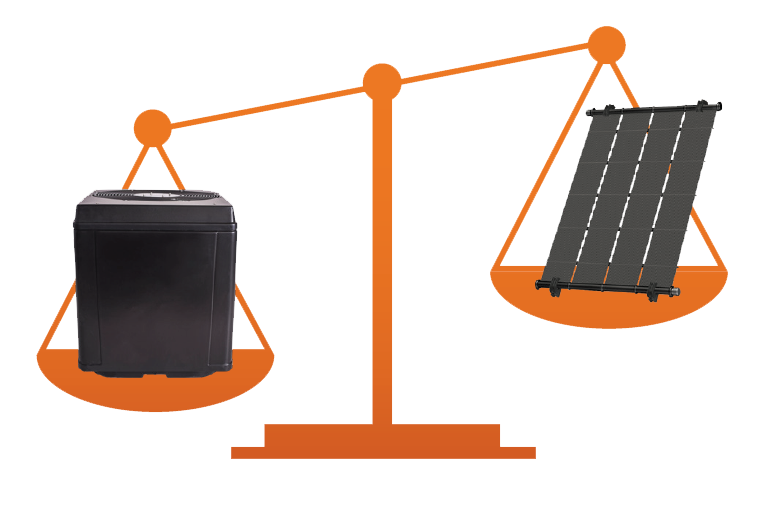
Now, let’s take a look at another option: solar pool heaters. Between this option and electric heat pumps, solar is the only one that requires no direct operational costs.
As mentioned before, based on outside temperatures affecting the pool water, experiencing heated pool water every day of the year is possible but will be based on weather conditions and time of year. Additionally, the number of hours of direct sunlight can also impact the results of solar heating.
In most cases, temperatures can reach up to 15 degrees Fahrenheit above that of an unheated pool. Typical daily maximum temperatures exceed that of unheated pools by about 10º F, or 15º F if using a pool cover. For some areas, this option may provide nearly year-round swimming enjoyment and in others, it will extend the swimming season until outdoor temperatures drop significantly.
Considerations for Solar Pool Heaters
On the downside, if you are looking for even warmer temperatures, or want to quickly heat a spa (solar heaters can take a couple to a few hours to heat up a spa to 100º F on a good day), a solar pool heater may not be reliable enough for you. If you want to virtually guarantee a set temperature each day, solar pool heaters may not be the best choice all year round. After all, it’s a weather-dependent technology!
On the other hand, an electric heat pump also cannot provide a guarantee. Like electric heat pumps, solar pool heaters will result in the warmest water later in the day after the sun has had a chance to warm not only the pool but the panels and the roof they are attached to.
Why Solar Pool Heaters Are So Popular
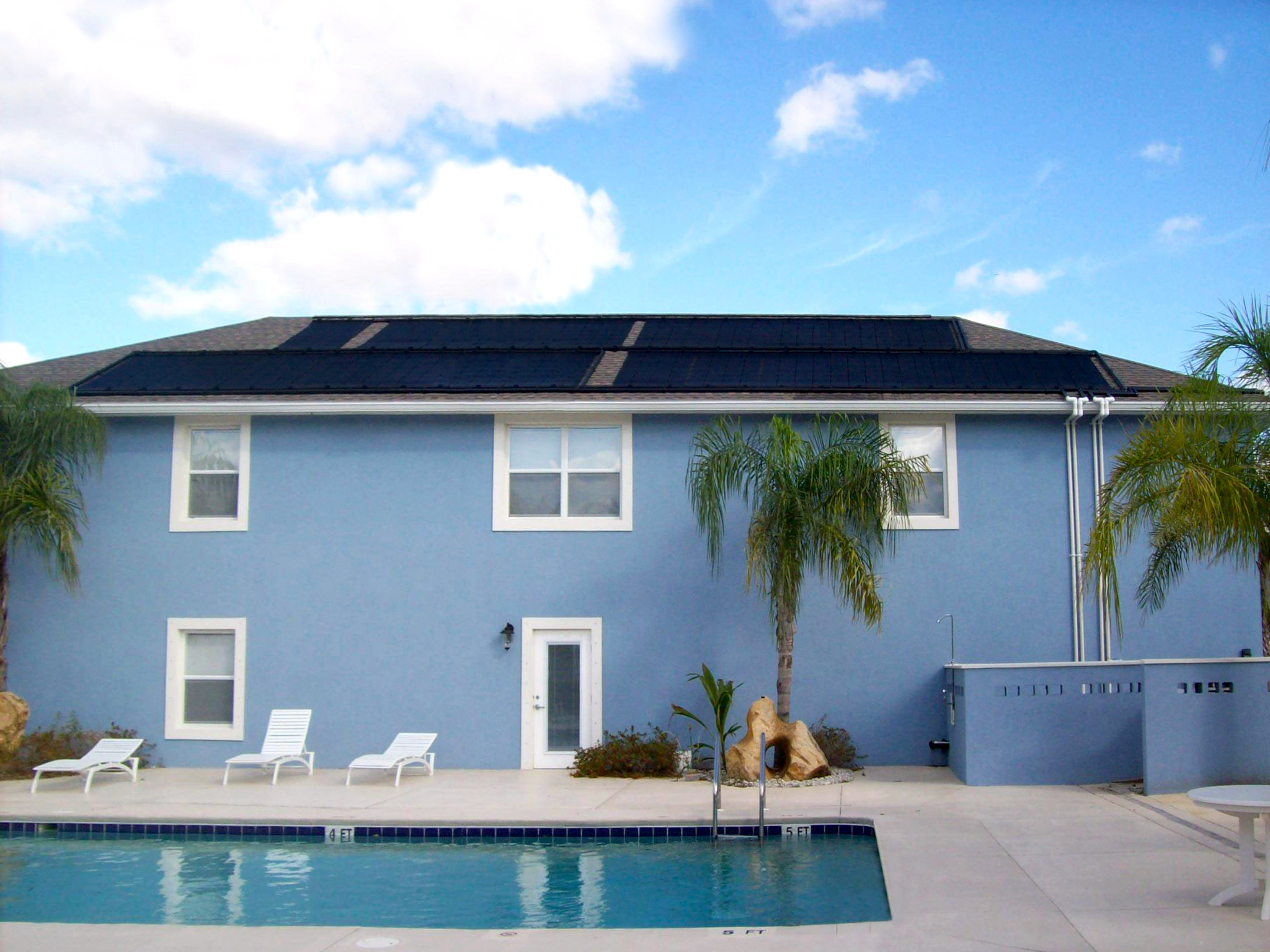
One of the main attractions solar pool heating offers is that it will heat your pool without operating costs, as the panels are tied into your existing pool pump to circulate the water up to the roof. Additionally, solar pool heating lasts about twice as long as a regularly used heat pump, as our systems here at UMA come with a 12-year warranty!
Plus, the maintenance costs are far lower (virtually nonexistent, in most cases). Because the initial cost of a solar pool heating is similar to the cost of a quality heat pump, many people conclude that the ongoing costs of a heat pump will likely prevent them from using it often, which translates into less enjoyment of their pool.
Cost Breakdown on Solar Pool Heaters
While there are initial costs associated with solar pool heaters, there are some significant long-term financial benefits to keep in mind.
Here’s a cost breakdown for an average size pool ranging from 350 to 400 sq. ft. using a solar pool heater, requiring 8 – 9 solar pool panels:
- Average cost of installation (includes permit, plumbing and automated temperature control panel) = $4,800 – $5,200
This price range is based on permit costs for your area, the type of roof the panels are being attached to, if it is a single- or two-story home, the type of pool equipment, the condition of the existing plumbing and where the best roof location is for the system (distance away from the pool equipment). With no additional electrical fees, a 12-year warranty, low maintenance and virtually worry-free operation of the system, the benefits of solar pool heating really stack up.
To learn more about solar pool heating, visit our FAQs page for answers to some of the most common solar questions we receive.
Benefits of Combining Both Together
A third option that you might consider is combining solar and electric. Solar pool heaters can complement an electric heat pump very well (or vice-versa). If your budget allows for it, you can install both systems: the solar pool heater will do the heavy lifting by heating your pool every day and maintaining higher average temperatures, allowing your heat pump to run less (far less, in fact).
Automation systems can make this marriage work seamlessly. It’s common to have a homeowner or commercial owner who’s tired of high electric bills install solar panels to reduce their electricity costs. In fact, in many situations at UMA, we add a solar pool heater to an existing heat pump and owners report never using the heat pump again (or only for spa heating).
If you’re interested in learning more about solar pool heaters or combining your electric pump with solar panels, we’re here to help.
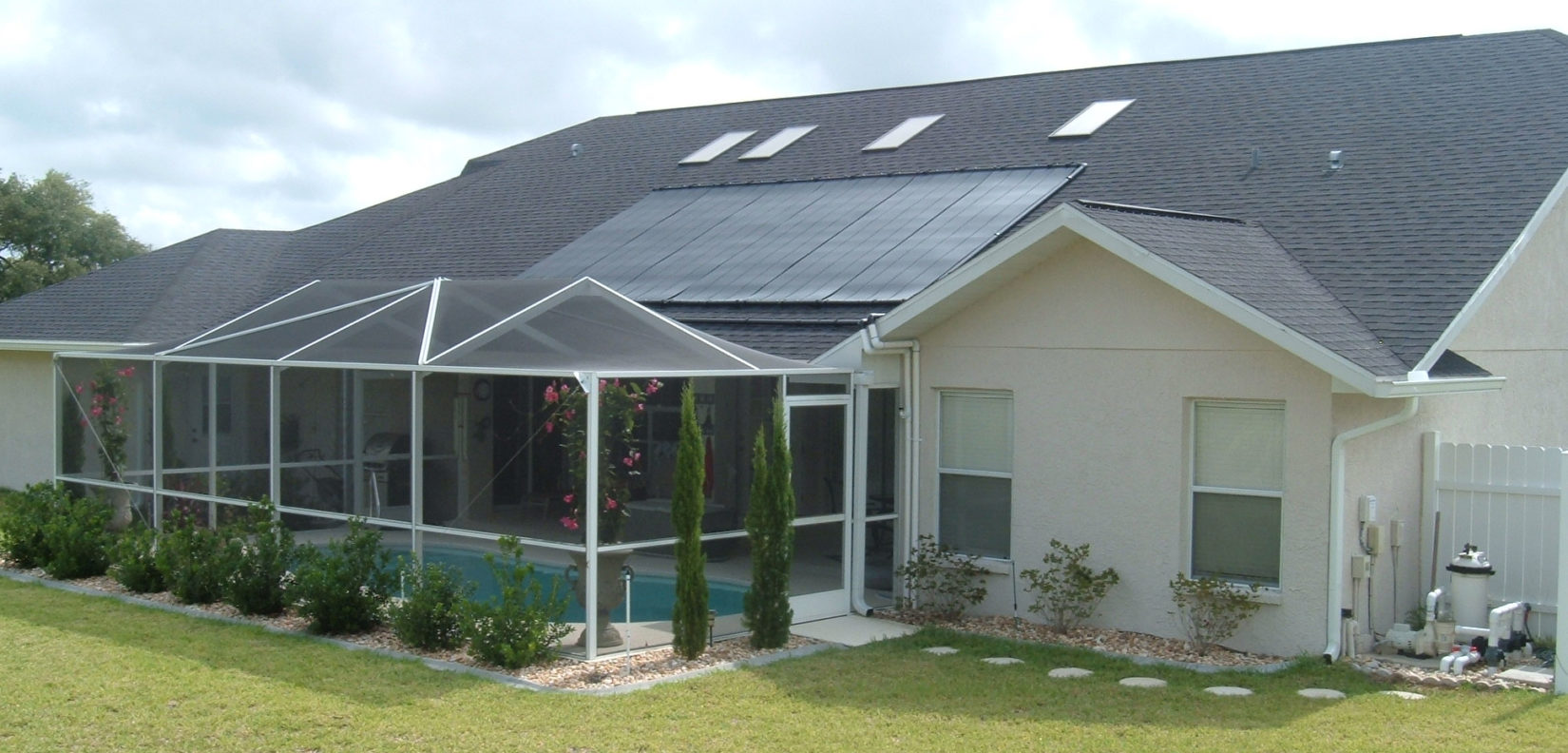
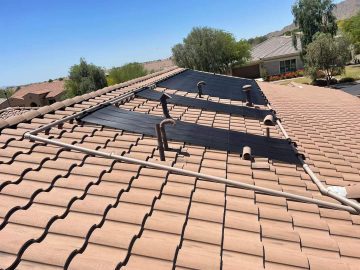
![4 Steps To Solar Pool Heater Installation [Infographic] 4](https://umasolar.com/wp-content/uploads/2021/07/shutterstock_80322160-scaled.jpg)
![How Solar Pool Heating Systems Work In 6 Steps [Infographic] 5](https://umasolar.com/wp-content/uploads/2021/09/child-with-father-in-swimming-pool-Arizona-2021-04-02-21-00-06-utc-scaled-1.jpg)
